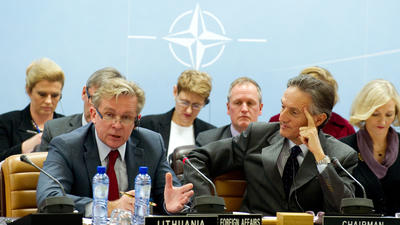-
Our work
-
Fields of work
- Arms control
- Border management
- Combating trafficking in human beings
- Conflict prevention and resolution
- Countering terrorism
- Cyber/ICT Security
- Democratization
- Economic activities
- Education
- Elections
- Environmental activities
- Gender equality
- Good governance
- Human rights
- Media freedom and development
- Migration
- National minority issues
- Policing
- Reform and co-operation in the security sector
- Roma and Sinti
- Rule of law
- Tolerance and non-discrimination
- Youth
- Field operations
- Projects
-
Meetings and conferences
- Summit meetings
- Review Conferences
- Ministerial Council meetings
- Plenary meetings of the Permanent Council
- Plenary Meetings of the Forum for Security Co-operation
- Security Review Conferences
- Annual Implementation Assessment Meetings
- Economic and Environmental Forum
- Economic and Environmental Dimension Implementation Meetings
- Human rights meetings
- Media conferences
- Cyber/ICT security conferences
- Conference of the Alliance against Trafficking in Persons
- Gender equality conferences
- Annual OSCE Mediterranean conferences
- Annual OSCE Asian conferences
- Partnerships
-
Fields of work
-
Countries
- All
-
Participating States
- Albania
- Andorra
- Armenia
- Austria
- Azerbaijan
- Belgium
- Belarus
- Bosnia and Herzegovina
- Bulgaria
- Canada
- Croatia
- Cyprus
- Czechia
- Denmark
- Estonia
- Finland
- France
- Georgia
- Germany
- Greece
- Holy See
- Hungary
- Iceland
- Ireland
- Italy
- Kazakhstan
- Kyrgyzstan
- Latvia
- Liechtenstein
- Lithuania
- Luxembourg
- Malta
- Moldova
- Monaco
- Mongolia
- Montenegro
- The Netherlands
- North Macedonia
- Norway
- Poland
- Portugal
- Romania
- Russian Federation
- San Marino
- Serbia
- Slovakia
- Slovenia
- Spain
- Sweden
- Switzerland – OSCE Chairpersonship 2026
- Tajikistan
- Türkiye
- Turkmenistan
- Ukraine
- United Kingdom
- United States of America
- Uzbekistan
- Asian Partners for Co-operation
- Mediterranean Partners for Co-operation
-
Structures and institutions
- Chairpersonship
-
Secretariat
- Secretary General
- Office of the Secretary General
- Conflict Prevention Centre
- Transnational Threats Department
- Office of the Special Representative and Co-ordinator for Combating Trafficking in Human Beings
- Office of the Co-ordinator of OSCE Economic and Environmental Activities
- Gender Issues Programme
- Opportunities for Youth
- Department of Human Resources
- Department of Management and Finance
- Office of Internal Oversight
- Documentation Centre in Prague
- Institutions
-
Field operations
- Presence in Albania
- Centre in Ashgabat
- Programme Office in Astana
- Programme Office in Bishkek
- Mission to Bosnia and Herzegovina
- Programme Office in Dushanbe
- Mission in Kosovo
- Mission to Moldova
- Mission to Montenegro
- Mission to Serbia
- Mission to Skopje
- Project Co-ordinator in Uzbekistan
- Closed field activities
- Parliamentary Assembly
- Court of Conciliation and Arbitration
- Organizational structure
- About us
Press release
Untapped potential for increasing security co-operation, says OSCE Chairperson to NATO North Atlantic Council

- Date:
- Place:
- Brussels
- Source:
- OSCE Chairpersonship, Partnerships
BRUSSELS, 23 November 2011 – NATO and the OSCE have complementary roles to play in promoting security in the Euro-Atlantic and Eurasian region as well as in Asia and the Mediterranean, said the OSCE Chairperson-in-Office, Lithuanian Foreign Minister Audronius Ažubalis, in an address to NATO’s North Atlantic Council in Brussels today.
“NATO and the OSCE have worked to reach common objectives - establishing security and promoting democratic ideals in the Euro-Atlantic and Eurasian region and with our Partners for Co-operation in Asia and the Mediterranean,” he said.
“NATO and the OSCE have complementary roles to play. We work in tandem toward the establishment of secure conditions in which governments and societies can work openly and co-operatively on behalf of their people.”
Ažubalis, emphasizing the importance of maintaining close working relations between the two organizations, said there remained untapped potential for working with and within the OSCE to address shared security challenges.
On North Africa, the Middle East and Afghanistan, he said the OSCE Foreign Ministers would discuss the potential for enhancing OSCE support at the Ministerial Council in Vilnius on 6 and 7 December.
Ažubalis outlined OSCE work to address transnational threats, and support arms control and confidence and security building measures. He also discussed the OSCE’s efforts to support democratic institutions in Kosovo and resolve protracted conflicts in the OSCE area, and expressed concern about the situation in Belarus.
He emphasized the OSCE’s comprehensive approach to security, and expressed hope that decisions would be taken at the Vilnius Ministerial Council on issues ranging from the safety of journalists to the OSCE’s role in promoting energy and cyber security.
“It is important that OSCE remains the primary venue for broad security dialogue in the Euro-Atlantic and Eurasian area. Only this approach can unite all OSCE participating States, free of dividing lines, conflicts, spheres of influence and zones with different levels of security,” said Ažubalis.
“The process of reform and fulfilling OSCE commitments is evolutionary at best, progressing sometimes only millimeter by millimeter. It is a process we all must continue to commit ourselves to pursue, however, through continued co-operation, mutual support and complementary activities and actions.”